July 1996
<<< Monday, 1 -
Wednesday, 3 July 1996
Spent two days travelling along the I90 from Austin,
Minnesota to Custer, South Dakota
(Great Faces, Great Places) where we will be camped for four days
over Independence Day. The first 400 miles were very flat and
uninteresting with a few farms and cattle but as we neared Rapid
City we started climbing and did not stop until we reached
5,500ft at Custer. Spectacular scenery in all directions with the
Black Hills of
Dakota as a background. On the way we stopped for a
short while at the 1880 Town, which is a small museum town,
containing original cowboy town buildings and artefacts, it
provided a pleasant break from the flat plains!
|
0n the way across the plains we had seen what seems
like hundreds of signs advertising Wall Drug in the town of Wall. This
gives you some idea of the size of the country and the type of terrain
since we saw the first sign for Wall Drug some 500 miles from its
location.
|
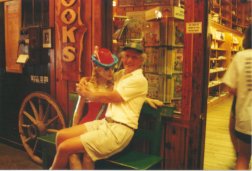 |
|
In the store itself, we saw a photo of a red London
bus outside Stockwell bus station with an advert saying 5,130 miles to
Wall Drug! Wall Drug was originally a very small drug store but made its
name in 1932 by tempting weary travellers off the main road and into the
town by offering free iced water and coffee for 5c. Being very hot we
partook of the free ice water and the 5c coffee was also good.
|
| Nowadays the store has almost taken over
the town being a major tourist attraction with cafes,
western shops, art exhibitions and the usual tee shirts.
Every passing tourist visits the place and the car parks
are enormous and full. Finished off a very hot day with a
nice electric storm which echoed around the mountains! |
Thursday, 4 July 1996
|
Started fairly early this morning to drive through
some of the seventy-three thousand acres of
Custer State Park where buffalo and other wildlife roam. The
first life we saw were very cute Prairie Dogs which, despite notices to
the contrary, people were feeding, and then we were told there was a
herd of Buffalo ahead. Off we went and after a couple of miles, we saw
about 500 buffalo (bison) crossing the road. There were many very young
ones and some huge bulls, it was a tremendous sight. It made us wonder
what it was like in the days when a herd of buffalo could be 20,000 or
more.
|
|
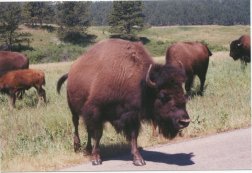 |
We then took the road to Rushmore
to see the president's heads carved out of the Black Hills
rock, being Independence Day and a public holiday
everybody else had the same thing in mind, many were
wearing their patriotic clothing. |
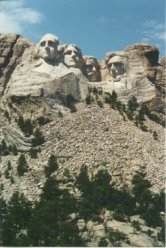 |
The carving of the
Presidents is tremendously impressive and one is left
full of admiration for the skill of the sculptor Gutzon Borglum who
spent some 20 years working on the carving and died just before its completion.
|
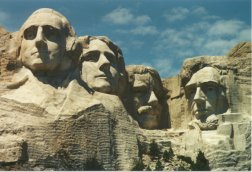 |
| To give the scale a
perspective, the nose of President Washington is some 20
foot long. |
It was then along the Needles Highway which is a 14-mile road which twists
and turns through towering granite spires. In the evening like all Americans, we
went to a fireworks display and being America it was, of course, a drive-in
display!
Friday, 5
& Saturday, 6 July 1996
|
The Badlands of SD
are awe-inspiring and in our experience, unique. Out of the
Dakota Prairie, rain, wind
and frost have carved steep canyons, sharp ridges, gullies, spires, and
knobs, exposing a variety of different coloured soil layers in the sides
of the terrain. Erosion over thousands of years has created a weird
(moon-like?) landscape as the volcanic ash was washed away. Even today
it is a very desolate area where is it possible to drive for miles
without seeing a building. We followed a sign which read food 13 miles,
which turned out to be a house in the middle of nowhere. The owners were
a little strange but very friendly bunch (free coffee for English
visitors) They are of Sioux descent, however, the latest member is a
German girl who happened upon the place whilst on holiday and liked it
so much that she married the son of the owner. She now runs a trading
post where some of the 11,000 Indians from the local reservation buy
clothing and items for their crafts.
|
|
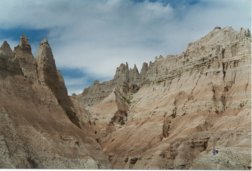 |
| |
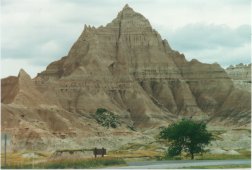 |
Sunday, 7 July 1996
Dr Niblack was one of the foremost wood carvers in the US,
who after a career as a chiropractor started wood carving at the age of 42,
spending over 70,000 hours carving the most beautiful figures, many of which are
animated. A museum located on the outskirts of Custer SD displays his life’s
work as well as examples from many other top US wood carvers. It is well worth a
visit if only to enjoy his strange sense of humour displayed through his
carvings.
Monday, 8 July 1996
We up at 5.00 a.m. to see the wildlife in Custer Park where we saw buffalo
and numerous red deer. Unfortunately, we have also seen many deer dead along the
side of roads, but this must be an indicator that deer are numerous in this part
of the world.
Some 26,000 years ago in Hot Springs, SD, a
deep hole was formed when a limestone cave collapsed. In time the sinkhole
filled with water but due to the steep sides, many animals including mammoths
could not climb out and eventually died in the hole. After 20 years of
excavation, the remains of 51 large Colombian and woolly mammoth bones (all
male) have been found as well as camels and other animals. The excavation will
continue for another 20 years by which time it is expected that in total some
100 mammoths will be found. This site is the only in-situ (bones left as found)
display of fossil mammoths in America. We found that the way the ongoing
excavation was displayed gave an excellent insight into what was a very
different world when the 14-foot-high mammoths roamed the earth. Mammoths died
out some 10,000 years ago.
Tuesday, 9 July 1996
We choose the coldest day for some months to explore
Jewel Cave, SD where the temperature is a constant 49F. The cave complex
is the third largest in the world with 50 miles explored since 1908 and it is
believed that the caves extend another fifty miles. Protecting the cave from
contamination by the thousands of visitors is taken very seriously by The
National Parks Service. This includes periodic biological spraying of the rocks
and crystals, barriers to prevent touching the formations and covers under the
walkways to prevent anything from being dropped onto the rocks. We took the
1.25-hour tour but it is possible to don caving gear and crawl for 4 hours
through some very narrow passages - too strenuous for us. An interesting cave
mainly due to its size but it did not contain as many stalagmites and
stalactites as other caves we have seen.
Finished installing our RV security alarm which worked the first time -
George was amazed and took a bow.
Wednesday, 10 July 1996
Decided to revisit some of the Custer State Park, in
particular, the Needles Pass and again we were
captured by the beauty of the area. A lot of the park is very lush grass plains
which provide an abundance of food for a variety of animals such as the herds of
buffalo and deer. The grass plains are a mixture of grasses in a variety of
colours which includes a very attractive yellow variety. In the afternoon we
visited the Cosmos and the only word for it is -
weird. It is an old wooden structure built at odd angles on the side of a steep
hill and during the tour, water appears to run uphill and it is possible to
stand on the wall face. It is done so well that one's senses are completely
fooled into believing the impossible.
Thursday, 11 July 1996
Moved on from Custer with some regret as we found it a delightful place with
so much to see and do. We took the 385 and then the 85 and went through
Deadwood (of stagecoach fame) which lies in a very
deep and beautiful valley surrounded by extremely attractive dark red rocks.
Deadwood is now a gambling town with numerous casinos. We were soon in
Wyoming with awe-inspiring views of wide valleys
and again red rocks all around, passing Sundance (of kid fame) but it had little
to offer.
|
We
had a close encounter of another kind when we saw Devil's Tower which is
the rock tower featured in the film Close Encounters of a Third Kind.
Devil's Tower is an extinct volcano
that erupted some 60 million years ago in three stages, however, the
Indian explanation is much more romantic. It is an amazing sight as its
columnar structure climbs vertically for 867 feet in an area which is
relatively flat, albeit at 4,000 feet and it rightly deserves to be
America's first national monument. |
|
We
camped at the base of Devils Tower, and to set the mood the Close
Encounter film was shown in the campground near a big campfire and under
a clear and beautiful bright starlight night - let's hope "they" don't
visit tonight! |
|
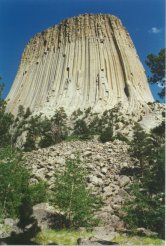 |
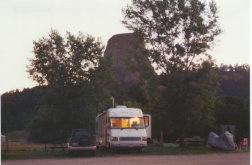
|
|
Friday, 12 - Monday, 15 July 1996
We are now definitely in the west with its wide open country, cattle and oil
donkeys. Many of the men wear cowboy hats and boots and we have even seen horses
hitched outside a shop. We continued along the I90 until we reached
Buffalo which stands at the foot of the
Big Horns, being our first view of the
Rocky Mountains even in July the peaks are
snow-capped as they reach over 12,000 feet. Buffalo (like Custer) is what we
regard as a typical western town, being fairly small, with very wide streets
(wide enough for a stagecoach to turn around), single-story buildings, a few
small shops and very friendly people. One evening we went to a Rodeo which was a
scream since in addition to the usual bucking broncos and bulls there were pig
wrestling competitions. Teams of children, ladies and men after coating their
hands in grease tried to catch a pig (also covered in grease) and pick it up and
put it in a barrel, needless to say, the pig is not too happy about it all.
Before the start of the pig catching, the teams were auctioned to the highest
bidder in the audience and we were surprised as some of the teams fetched over
$100.
Other than the few main roads most of the roads are dirt or gravel tracts and
oncoming vehicles are heralded by a cloud of dust up the road. The 4X4 is coming
into its own with trips into the mountains down winding and steep dirt tracts.
One of these trips was along Crazy Women Pass which descended some 5,000 feet
through a deep valley, halfway along was a classic canyon which would be perfect
for a western film shoot-out.
We were fortunate to arrive in Buffalo in time for their annual old wild west
parade which included many traditional horse-drawn settler wagons, soldiers in
1850 outfits, trappers and Indians. The parade lasted about 30 minutes and
seemed to include a large number of the local inhabitants who enjoyed the
occasion as much as the tourists. The only unhappy attendee was a young buffalo
which was tethered by a short rope to the back of a covered wagon and was in
effect being dragged along by a ring through its nose!
Tuesday, 16 - Sunday, 21 July 1996
At the crack of yet another very beautiful dawn (we have
had months of beautiful days), we set out along the I90 on our way to
Billings, Montana (Big Sky Country) to attend the
FMCA International rally. The nearer we got the more motor homes we saw, on
arrival we were directed to a holding area and awaited our turn for nearly three
hours before being led to our camping area. With some 4,600 motor homes
attending the rally we were camped all over the town on various vacant lots some
being quite rough, ours was an old drive-in movie area. One man shot a
rattlesnake which he had found on his campsite. The actual rally was held on the
grounds and buildings of a giant convention centre, starting each morning with
coffee and doughnuts accompanied by a country and western band. There were lots
of different seminars ranging from generator maintenance to microwave cookery,
so there was plenty to keep everybody occupied. The main exhibition hall was
full of stalls selling a full range of items to tempt the RVer. As usual, George
could not resist buying a new toy or two, but as usual, big boys' toys have big
price tags! Outside the dealers had bought along the new range of motor coaches,
most of which were very expensive at well over $100,000. Not many people were
looking over them during the daytime as the temperature was very nearly in the
100s.
The rally included evening entertainment for all three
evenings, consisting of music by Country and Western groups, the
second evening included Stella Parton (Dolly's younger sister).
Tuesday, 23 July 1996
|
Left Billings and headed southwest into
Wyoming, again driving through some beautiful mountainous scenery to
the small town of Cody (Buffalo Bills'
birthplace) where we are staying for a few days. When one visits places
like this, it brings home that names like Buffalo Bill and Annie Oakley
were real people who were legends in their own time.
|
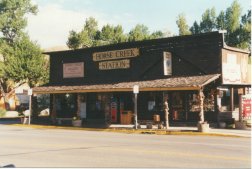 |
|
William Cody (Buffalo Bill) initially made a living by shooting
buffalo then selling the meat to the Army. Apparently his technique of
riding to the front of a charging herd, shooting the lead buffalo and
turning the herd on itself made him one of the best. He was an army
scout for about 4 years. Then for about 20 years he took his circus on
tours around the US and Europe, showing western techniques and
entertainment. The circus at its peak included about 80 Indians and
cowboys and was seen by royalty including Queen Victoria. |
| The Bill
Museum not only Buffalo
contains very good coverage of his life but also
houses the worlds largest collections of Indian artefacts
and firearms. |
Wednesday,
24 - Thursday, 25 July 1996
The valley pass from Cody to the east entrance of
Yellowstone National Park is
around 40 miles long, with dramatic mountain scenery along most of the route.
Soon after leaving Cody on the I14, the road enters a deep canyon containing the
Buffalo Bill reservoir, after which the road
is flanked by snow-covered mountains and a variety of rock formations. The
mountain rock is mainly a deep terracotta colour and due to erosion, many
strange shapes are formed, including large rocks balancing precariously on top
of tall thin pinnacles.
Nearly all the roads through the park close from November to
May due to the heavy snowfalls. When the summer arrives a vast
road reconstruction programme starts, on this occasion 11 miles
of road are under repair. We had to wait up to 30 minutes and
then were led by a pilot car in a large convoy through a rough
and very dusty road.
|
Yellowstone Park is vast and contains the
largest collection of thermal springs and geysers in the world. Steam
can be seen being emitted from holes in many locations, in particular
the West Thumb Geysers Basin
which is on the SW corner of Yellowstone lake. West Thumb dumps some
3,100 gallons of hot water into the lake every day. This area has many
thermal springs but hardly any active geysers unlike the Upper Geyser
Basin some 30 miles to the west.
|
|
The upper Basin has at least twelve active geysers
including the famous Old Faithful, which erupts every 60 to 100 minutes,
all day, every day, with eruptions lasting up to five minutes and
reaching a height of 100 to 180 feet. With about a thousand others, we
watched Old Faithful perform and it is
impressive. We thought we were being clever by positioning ourselves
upwind, but just before the moment of the eruption the wind changed
direction and we were sprayed with sulphur-smelling water. At both
locations, boardwalks enable one to safely get around, but 12 people
have been killed and 100's badly scalded in recent years because they
ignore the signs.
Yellowstone park (the word "park" does not do it justice as it covers
3,472 square miles) has two circular routes, both having wide valleys,
high mountains, numerous creeks and a variety of interest points and
wildlife. At various locations, we saw elk, moose, deer, a herd of
buffalo, coyotes, marmots, ground squirrels and osprey. One of the
highlights was when we saw a grizzly bear slowly moving through tall
grass and eating the wildflowers.
|
|
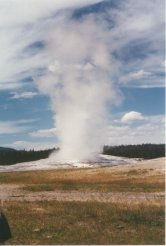
|
| |
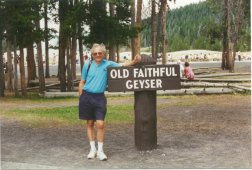 |
|
To us, it is amazing
that wildlife is not treated with more respect,
as many injuries happen each year because people
get too close to animals such as buffalo and
bears
|
Wildflowers of every colour are in profusion throughout the park, many of which
have alpine characteristics. The Indian Paint Brush in particular stands out
being dark red and one can understand how it got its name.
We had an enjoyable evening at the Cody rodeo which had numerous events
including traditional bareback riding, saddle bronco, bull and steer riding, to
catching cattle using lassos. We had a good laugh when children tried to catch a
young calf and remove ribbons tied to its tail.
Friday, 26 - Saturday, 27 July 1996
Thermopolis is some 80 miles south of Cody
and has the largest hot spring in the world. Some 3.6 million gallons of water
at 130F flow each day into the Big Horn river, forming large calcium walls along
the river bank. The hot spring water also flows through a water fun park and the
State bath house.
We spent a couple of interesting hours at the
Wyoming Dinosaur Centre which is
very actively excavating numerous sites. They have so far found seven different
genera of dinosaurs all of which are in excellent condition due to the
green/grey mud which has acted like a cast, preserving the bones. It takes
several years to excavate, clean, preserve and mount a large dinosaur. Since the
first discovery was not until 1994, many of the displays are from other parts of
the world including the Isle of Wight in England!
About 4 miles south of Thermopolis is the entrance to
Wind River Canyon which winds for 10
miles through an Indian reservation. It is a very dramatic canyon with a
fast-flowing white water river along its length and canyon sides soaring to some
1,500 feet above the river. The road which follows the river provides
magnificent views throughout the length of the canyon and George felt quite
envious as we watched two inflatable crafts working their way through the
rapids.
Sunday, 28 -
Tuesday, 30 July 1996
We decided that we would spend about a week in the Great Tetons National Park
prior to travelling to Phoenix, Arizona,
which is about 1,000 miles to the south in preparation for our flight home.
On route, we stayed at Dubois
for two days which is another cowboy town, which like so many small
towns in this part of the world, depends fairly heavily on tourists for
part of their economy. Wyoming calls itself the cowboy state and Dubois
in keeping, has traditional stagecoach rides, saloons, Indian craft
shops, and trading posts which sell everything including horseshoes,
furs and cowboy outfits. Most of the campgrounds have tepees which can
be rented for about $25 a night.
|
|
Many of these cowboy towns have a shoot-out at around 6 pm. normally
outside the saloon, which enables the dispute to be settled over a
drink. Dubois has a traditional western look with many single-story
wooden shops fronted by wooden boardwalks along much of the main street.
Many of the local men still wear full cowboy outfits as they go about
their daily business.
|
|
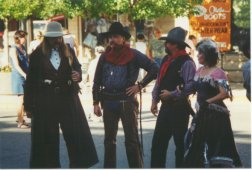 |
Dubois has the largest long-horn sheep herd in the US but we did not see any
they move high into the mountains during the summer and only come down to road
access level during the winter - we did not fancy climbing several thousand
feet! >>>











